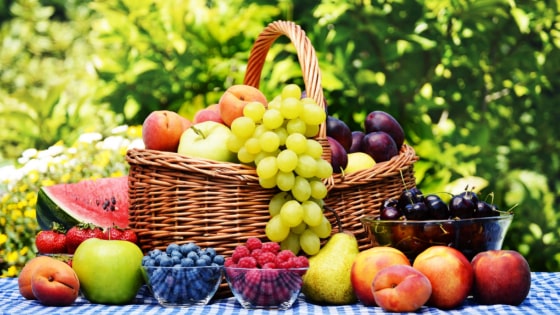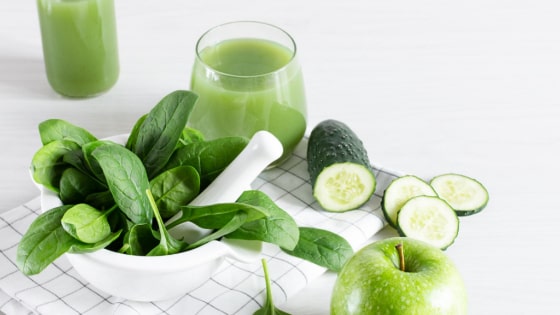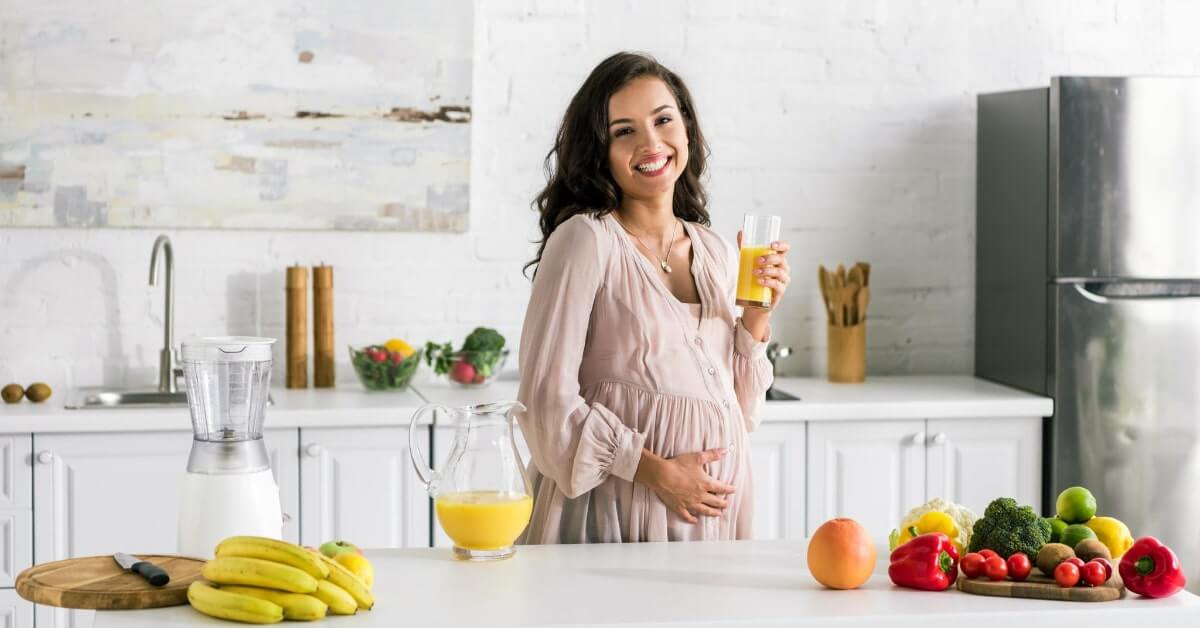It’s no secret that juicing is a wonderful method to consume all of the nutrients your body requires. What many people don’t know, however, is that juicing may be really useful during pregnancy.
Pregnancy is a time to pay close attention to your diet and make sure you’re getting all of the nutrients your body requires. Juicing may be an excellent method to achieve this.
According to a study published in the National Library of Medicine, pregnant women who eat fruits improve their children’s growth and brain development.
Juicing is one of the few things that are as essential to our general health and well-being as eating. Juicing allows us to absorb all of the health benefits of fruits and vegetables without having to chew or eat them whole.
Juicing while pregnant can help you get the recommended fruits and vegetables into your diet while also providing other nutrients like folic acid, vitamins A and C, potassium, and magnesium.
In this article, I’ll show you why juicing is a perfect way to get essential nutrients during pregnancy.
Let’s get started!
What Juicing is and Why it’s Important While Pregnant

Juicing is a great way to get your daily dose of fruits and vegetables, especially when you’re pregnant. Juicing provides important nutrients like folate, which is crucial for healthy fetal development.
Folate can help prevent some congenital disabilities of the brain and spine. It’s also a good way to get fiber, vitamin C, and potassium.
When you’re pregnant, it’s important to eat a variety of healthy foods to get the nutrients you and your baby need. Juicing is a great way to do that.
You can add fresh or frozen fruits, vegetables, and even herbs to your juice. Just be sure to wash all produce thoroughly before juicing.
If you’re new to juicing, start with recipes that have ingredients you already like. As you get more comfortable, you can experiment with different flavors. For example, adding ginger or mint to your juice can give it a refreshing flavor.
Pregnant women should avoid unpasteurized juices, as they may contain harmful bacteria. It’s also important to talk to your doctor about how much juice you should drink while pregnant. Too much juice may add extra calories and sugar to your diet.
What Fruits and Vegetables are Safe to Juice During Pregnancy

When it comes to juicing during pregnancy, some fruits and vegetables are better than others. It is important to stick to safe, nutrient-rich options that will help keep you and your growing baby healthy.
Some of the best fruits and vegetables to juice during pregnancy include;
- Apples: Apples are a great source of fiber and vitamins A, C, and K. They can help to regulate blood sugar levels and are thought to promote a healthy pregnancy.
- Oranges: Oranges are a good source of folate, which is important for pregnant women. They also contain vitamin C, potassium, and fiber.
- Carrots: Carrots are an excellent source of beta-carotene, which is converted to vitamin A in the body. Vitamin A is important for fetal development and growth. Carrots also contain vitamins B6, C, and K.
- Celery: Celery is a good source of vitamins A, C, and K. It also contains folate and potassium.
- Pineapple: Pineapple is a good source of vitamins C and B1. It also contains the enzyme bromelain, which is thought to have anti-inflammatory properties.
It is important to avoid juicing any fruits or vegetables that may contain harmful toxins or bacteria. The Dirty Dozen is a list of fruits and vegetables that should be avoided due to the presence of pesticides.
Unpasteurized juices, such as those produced at home from non-certified organic produce, are on the list. Pregnant women should also avoid consuming any juices that are high in sugar or caffeine.
Overall, juicing during pregnancy is a great way to get nutrients into your body and your baby’s diet. Stick to the safe options listed above and enjoy the many health benefits of juicing!
The Benefits of Juicing During Pregnancy
By juicing, you are able to consume more nutrients than you would be able to eat whole. This is important because you need all the nutrients you can get during pregnancy to ensure a healthy baby.
Juicing also helps with digestion, which can be a problem during pregnancy, but juicing can help with that. By juicing, you are able to get all the nutrients your body needs without having to worry about digestion issues.
Pregnancy can be a difficult time for many women. There are so many changes happening in your body and you may feel like you can’t do anything right. Juicing can help with that. If you are having trouble eating, juicing can help you get the nutrients you need.
How to Make a Healthy Juice for Pregnant Women (with recipe)
When you’re pregnant, it’s important to eat a healthy diet. This includes drinking plenty of fluids, including juice. But not just any juice will do – you need to make sure it’s a healthy juice for pregnant women.
Here’s how to make a healthy and fresh juice;

1. Start by gathering your ingredients. You’ll need:
– 1 cup of spinach
– 1/2 a cucumber
– 1/2 an apple
– 1/4 of a lemon
2. Wash all of your produce thoroughly.
3. Add the spinach, cucumber, and apple to a blender or juicer.
4. Squeeze the lemon into the mixture.
5. Blend or juice until everything is smooth.
6. Enjoy your nutritious juice!
There are a few things to keep in mind when you’re making healthy juice. Make sure to wash all of your produce thoroughly before adding it to the blender or juicer. This will help to remove any harmful bacteria that could potentially make you sick.
Secondly, try to use organic produce whenever possible. This will help to reduce your exposure to pesticides and other harmful chemicals. Finally, drink your juice right away – it’s best when it’s fresh!
Drinking healthy juice for pregnant women is a great way to get the nutrients you need. Spinach is a great source of folic acid, which is essential for pregnant women.
Cucumbers are a good source of hydration, and apples provide fiber and antioxidants. Lemons add a boost of Vitamin C.
All of these ingredients come together to make a delicious and healthy juice that will help you to stay healthy during pregnancy. So, next time you’re looking for a healthy snack, try whipping up a batch of this healthy juice! You’ll be glad you did.
The Best Way to Get Your Daily Dose of Nutrients During Pregnancy
There are a few key things to remember when it comes to ensuring you are getting the nutrients you need during pregnancy. First, try to eat a balanced diet and include plenty of fruits and vegetables.
Second, make sure you are taking a prenatal vitamin supplement. Third, consider drinking juice or smoothies regularly as a way to get more nutrients in your diet. Finally, don’t forget to stay hydrated by drinking plenty of water daily.
If you are like most women, you probably have a lot of questions about nutrition during pregnancy. What are the best foods to eat? How much weight should I gain?
What supplements do I need to take? These are all valid questions that deserve thoughtful answers.
The best way to get the nutrients you need during pregnancy is to eat a balanced diet that includes plenty of fruits and vegetables.
Fruits and vegetables are packed with vitamins, minerals, and antioxidants that are essential for a healthy pregnancy. Aim to eat at least five servings of fruits and vegetables per day.
In addition to eating a healthy diet, you should also take a prenatal vitamin supplement. A good prenatal vitamin will help to ensure that you are getting all of the nutrients you need during pregnancy.
following a nutritious diet during pregnancy is one of the best things you can do for yourself and your baby. By eating a variety of healthy foods and drinks, you can help to ensure that you are getting all of the nutrients you need.
So, don’t hesitate to ask your healthcare provider for guidance on nutrition during pregnancy.
Finally, don’t forget to stay hydrated by drinking plenty of water daily. water is essential for a healthy pregnancy. It helps to keep your body hydrated and flush out toxins. Be sure to drink eight glasses of water per day.
Tips for Juicing During Pregnancy
1. Drink plenty of fluids every day. Juicing is a great way to increase your fluid intake, but make sure to also drink plenty of water and other fluids throughout the day.
2. Avoid juicing high-sugar fruits. While juicing can help you meet your daily fruit requirements, it’s important to avoid juicing fruits that are high in sugar. Stick to lower-sugar options like berries, melon, and citrus fruits.
3. Get plenty of fiber. Juicing can help you meet your daily fruit and vegetable requirements, but it’s important to make sure you’re also getting plenty of fiber. Add a cup of leafy greens or half a cup of cooked beans to your juice to boost its fiber content.
4. Choose low-fat options. If you’re juicing for weight loss or to lower your cholesterol, choose lower-fat options like almond milk or vegetable juice.
5. Add healthy fats. While you want to avoid high-fat options like whole milk, adding healthy fats to your juice can help you absorb more nutrients. Add a tablespoon of olive oil or flaxseed oil to your next juice for an extra boost of healthy fats.
6. Get your doctor’s okay. If you have any medical conditions or are pregnant, it’s important to get your doctor’s okay before starting a juicing program. Some fruits and vegetables may not be safe for people with certain medical conditions, so it’s best to err on the side of caution.
7. Drink it fresh. Juice is best when it’s fresh, so try to drink your juice right after you make it. If you need to store it, keep it in the fridge for no more than 24 hours.
8. Rinse your produce. Be sure to rinse your fruits and vegetables thoroughly before juicing them. This will help remove any dirt or pesticides that may be on them.
9. Peel tough skin. If you’re having trouble getting all the nutrients out of a particular fruit or vegetable, try peeling its skin before juicing it. This will help ensure that you get all the nutrients from the fruit or vegetable, without any of the bitterness that can come with the skin.
10. Experiment with different combinations. Juicing is a great way to get your daily fruits and vegetables, but it’s also a great opportunity to experiment with different flavor combinations. Try adding a variety of fruits and vegetables to your juicer, and see what flavors you come up with!
Conclusion
Juicing during pregnancy is a great way to ensure you are getting all the nutrients your body needs. By following these tips, you can juice safely and effectively while pregnant. Be sure to consult with your doctor before starting a juicing program, especially if you have any medical conditions. And most importantly, enjoy your fresh juices!
FAQ
1. Can I drink juice while pregnant?
Yes, you can drink juice while pregnant! Just be sure to choose pasteurized juices to avoid any potential foodborne illnesses. If you’re looking for a nutritious way to quench your thirst during pregnancy, freshly squeezed juice is a great option. Packed with vitamins, minerals, and antioxidants, juicing can help support a healthy pregnancy.
2. What kind of juice is best to drink while pregnant?
The best juices to drink during pregnancy are those that are high in nutrients and low in sugar. Freshly squeezed vegetable juices are a great option, as they’re packed with vitamins, minerals, and antioxidants.
You can also add a small amount of freshly squeezed fruit juice to your veggie juice to make it more palatable. Just be sure to limit your intake of sugary fruit juices, as they can contribute to pregnancy weight gain and gestational diabetes.
3. What juices to avoid while pregnant?
You should avoid unpasteurized juices, as they may contain harmful bacteria that can cause food poisoning. Additionally, you should limit your intake of sugary fruit juices, as they can contribute to pregnancy weight gain and gestational diabetes.
4. Which juice is good during pregnancy?
While any juice can be enjoyed in moderation while pregnant, freshly squeezed vegetable juices are a great option, as they’re packed with vitamins, minerals, and antioxidants.
You can also add a small amount of freshly squeezed fruit juice to your veggie juice to make it more palatable. Just be sure to limit your intake of sugary fruit juices, as they can contribute to pregnancy weight gain and gestational diabetes.
5. Is carrots and celery good for pregnancy?
Carrots and celery are both great vegetables to include in your diet during pregnancy. They’re packed with nutrients like vitamins A and C, folic acid, and potassium, all of which are important for a healthy pregnancy. Juicing is a great way to get your daily dose of these nutritious veggies.
6. Can I eat avocado during pregnancy?
Yes, you can eat avocado during pregnancy! Avocados are a great source of healthy fats, vitamins, and minerals. They can help support a healthy pregnancy and may even help reduce the risk of certain birth defects.
